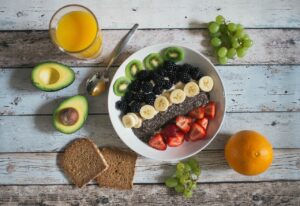Anti-cancer nutrition refers to the practice of consuming foods that have been shown to prevent or fight against cancer. It involves making conscious choices about what we eat in order to reduce our risk of developing cancer or to support our bodies during cancer treatment. Nutrition plays a crucial role in cancer prevention and treatment because the foods we eat contain various compounds that can either promote or inhibit the growth of cancer cells.
Key Takeaways
- Anti-cancer nutrition involves incorporating whole foods and avoiding processed foods and sugar.
- Phytochemicals found in plant-based foods have cancer-fighting properties.
- Superfoods like berries, leafy greens, and cruciferous vegetables can help prevent cancer.
- Antioxidants found in fruits, vegetables, and nuts can boost your body’s ability to fight cancer.
- A plant-based diet rich in healthy fats can help prevent cancer and improve overall health.
The Role of Phytochemicals in Fighting Cancer: A Comprehensive Overview
Phytochemicals are naturally occurring compounds found in plants that have been shown to have numerous health benefits, including their ability to fight against cancer. There are thousands of different types of phytochemicals, each with its own unique properties and benefits. Some common types of phytochemicals include flavonoids, carotenoids, and polyphenols.
Phytochemicals can be found in a wide variety of plant-based foods, such as fruits, vegetables, whole grains, legumes, and herbs. These compounds work in various ways to fight against cancer. For example, some phytochemicals have antioxidant properties, which means they can neutralize harmful free radicals in the body that can damage cells and contribute to the development of cancer. Other phytochemicals have anti-inflammatory properties, which can help reduce chronic inflammation, a risk factor for cancer.
Superfoods for Cancer Prevention: Adding Color to Your Plate
Superfoods are nutrient-dense foods that are particularly beneficial for our health due to their high content of vitamins, minerals, and antioxidants. Many superfoods also happen to be rich in phytochemicals, making them excellent choices for cancer prevention.
Some examples of superfoods for cancer prevention include berries (such as blueberries, strawberries, and raspberries), leafy greens (such as kale, spinach, and Swiss chard), cruciferous vegetables (such as broccoli, cauliflower, and Brussels sprouts), and nuts and seeds (such as almonds, walnuts, chia seeds, and flaxseeds).
Incorporating superfoods into your diet can be as simple as adding berries to your morning oatmeal, including a handful of leafy greens in your lunchtime salad, or snacking on a handful of nuts and seeds in the afternoon. By adding these colorful and nutrient-rich foods to your plate, you can boost your intake of cancer-fighting compounds.
The Power of Antioxidants in Cancer Prevention: How to Boost Your Intake
Antioxidants are compounds that help protect our cells from damage caused by free radicals. Free radicals are unstable molecules that can cause oxidative stress in the body, leading to inflammation and damage to DNA, proteins, and other cellular structures. This damage can contribute to the development of cancer.
There are several types of antioxidants, including vitamins A, C, and E, as well as minerals like selenium and zinc. These antioxidants can be found in a variety of foods, including fruits, vegetables, nuts, seeds, whole grains, and legumes.
Antioxidants fight against cancer by neutralizing free radicals and reducing oxidative stress in the body. They also have anti-inflammatory properties that can help reduce chronic inflammation, which is a risk factor for cancer.
To boost your antioxidant intake, focus on consuming a wide variety of colorful fruits and vegetables. Aim to include at least five servings of fruits and vegetables in your daily diet. Additionally, consider incorporating nuts and seeds into your meals and snacks, as they are also rich in antioxidants.
The Anti-Cancer Diet: Incorporating Whole Foods into Your Meal Plan
Whole foods are foods that are minimally processed or refined and are consumed in their natural state. They are rich in nutrients and contain a wide range of beneficial compounds that can help prevent cancer.
Examples of whole foods for cancer prevention include fruits, vegetables, whole grains, legumes, nuts, and seeds. These foods are high in fiber, vitamins, minerals, and phytochemicals, all of which have been shown to have anti-cancer properties.
To incorporate more whole foods into your diet, focus on consuming a variety of fruits and vegetables. Choose whole grains like brown rice, quinoa, and whole wheat bread instead of refined grains. Include legumes like beans, lentils, and chickpeas in your meals. Snack on nuts and seeds instead of processed snacks.
By prioritizing whole foods in your diet, you can ensure that you are getting a wide range of nutrients and beneficial compounds that can help protect against cancer.
The Benefits of a Plant-Based Diet in Cancer Prevention: Going Green for Your Health

A plant-based diet is one that emphasizes the consumption of plant foods while minimizing or excluding animal products. This type of diet has been shown to have numerous health benefits, including its ability to prevent cancer.
Plant-based diets are rich in fiber, vitamins, minerals, antioxidants, and phytochemicals. These compounds work together to reduce inflammation, support the immune system, and inhibit the growth of cancer cells.
To transition to a plant-based diet, start by gradually reducing your consumption of animal products and increasing your intake of plant foods. Focus on incorporating more fruits, vegetables, whole grains, legumes, nuts, and seeds into your meals. Experiment with new recipes and flavors to make the transition enjoyable and sustainable.
The Importance of Healthy Fats in Cancer Prevention: Separating the Good from the Bad
Healthy fats are an essential part of a balanced diet and play a crucial role in cancer prevention. They provide energy, support cell growth and repair, help absorb fat-soluble vitamins, and contribute to hormone production.
Examples of healthy fats for cancer prevention include avocados, nuts and seeds, olive oil, coconut oil, and fatty fish like salmon and sardines. These fats are rich in omega-3 fatty acids, which have been shown to have anti-inflammatory properties and can help reduce the risk of cancer.
Incorporating healthy fats into your diet can be as simple as drizzling olive oil over your salad, adding avocado to your sandwich, or snacking on a handful of nuts and seeds. Aim to include a source of healthy fats in each of your meals to support your overall health and reduce your risk of cancer.
The Impact of Sugar and Processed Foods on Cancer: How to Avoid Hidden Dangers
Sugar and processed foods have been linked to an increased risk of cancer. Consuming excessive amounts of sugar can lead to weight gain, inflammation, insulin resistance, and an increased risk of developing certain types of cancer, such as breast, colorectal, and pancreatic cancer.
Processed foods, on the other hand, are often high in unhealthy fats, added sugars, sodium, and artificial additives. These foods lack the nutrients and beneficial compounds found in whole foods and can contribute to chronic inflammation and an increased risk of cancer.
To reduce your intake of sugar and processed foods, focus on consuming whole foods instead. Choose fresh fruits instead of sugary snacks or desserts. Cook meals from scratch using whole ingredients instead of relying on pre-packaged meals or fast food. Read food labels carefully and avoid products that contain added sugars or artificial additives.
Mindful Eating for Cancer Prevention: How to Tune into Your Body’s Needs
Mindful eating is the practice of paying attention to the present moment while eating, including the taste, texture, and smell of food. It involves listening to your body’s hunger and fullness cues and eating with intention and awareness.
Mindful eating can help prevent cancer by promoting a healthy relationship with food and reducing the risk of overeating or emotional eating. It can also help you make conscious choices about the foods you eat, allowing you to prioritize nutrient-dense, cancer-fighting foods.
To practice mindful eating, start by slowing down and savoring each bite of food. Pay attention to the flavors and textures and try to eat without distractions, such as watching TV or scrolling through your phone. Listen to your body’s hunger and fullness cues and eat until you are satisfied, not overly full.
Creating a Sustainable Anti-Cancer Diet: Tips for Long-Term Success

Creating a sustainable anti-cancer diet is essential for long-term success. It involves making gradual changes to your eating habits and finding a balance that works for you.
Start by setting realistic goals and making small changes to your diet. Focus on incorporating more whole foods, superfoods, and plant-based options into your meals. Experiment with new recipes and flavors to keep things interesting and enjoyable.
Find support from friends, family, or a registered dietitian who can provide guidance and accountability. Surround yourself with like-minded individuals who are also interested in maintaining a healthy lifestyle.
Remember that it’s okay to indulge in your favorite treats occasionally. The key is to focus on overall balance and moderation rather than strict rules or restrictions.
In conclusion, anti-cancer nutrition is an important aspect of cancer prevention and treatment. By understanding the basics of anti-cancer nutrition and incorporating principles such as phytochemicals, superfoods, antioxidants, whole foods, plant-based diets, healthy fats, mindful eating, and reducing sugar and processed food intake into our daily lives, we can make significant strides in reducing our risk of developing cancer. By creating a sustainable anti-cancer diet that is enjoyable and balanced, we can set ourselves up for long-term success in maintaining a healthy lifestyle.
If you’re interested in learning more about the role of nutrition in cancer prevention, you might also enjoy reading this article on “2 Types of Foods for Cancer Prevention: Are You Eating These Daily?” It provides valuable insights into specific foods that have been shown to have anti-cancer properties and explains how incorporating them into your daily diet can help reduce your risk. Check it out here.
FAQs
What is anti-cancer nutrition?
Anti-cancer nutrition refers to a diet that includes foods that have been shown to have cancer-fighting properties. These foods are typically high in antioxidants, vitamins, and minerals that can help prevent cancer cells from forming and spreading.
What are some examples of anti-cancer foods?
Some examples of anti-cancer foods include leafy green vegetables, berries, cruciferous vegetables (such as broccoli and cauliflower), garlic, turmeric, and green tea. These foods are high in antioxidants and other nutrients that have been shown to have cancer-fighting properties.
Can anti-cancer nutrition prevent cancer?
While there is no guarantee that anti-cancer nutrition can prevent cancer, studies have shown that a diet rich in anti-cancer foods can help reduce the risk of developing certain types of cancer. Additionally, anti-cancer nutrition can help support the immune system and overall health, which can also help prevent cancer.
Can anti-cancer nutrition be used as a treatment for cancer?
Anti-cancer nutrition should not be used as a sole treatment for cancer. However, a diet rich in anti-cancer foods can help support the body during cancer treatment and may help reduce the risk of cancer recurrence.
What are some other lifestyle factors that can help prevent cancer?
In addition to anti-cancer nutrition, other lifestyle factors that can help prevent cancer include regular exercise, maintaining a healthy weight, avoiding tobacco and excessive alcohol consumption, and getting regular cancer screenings.








